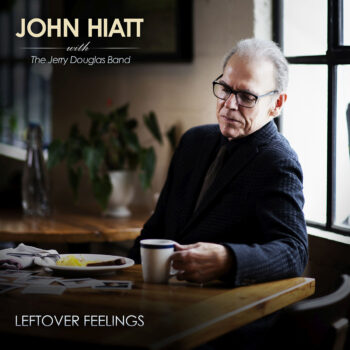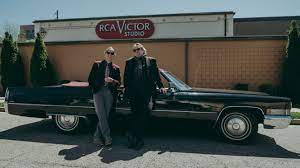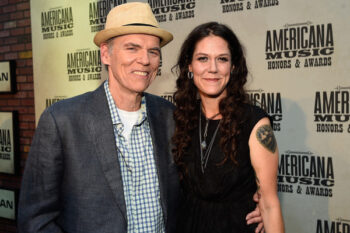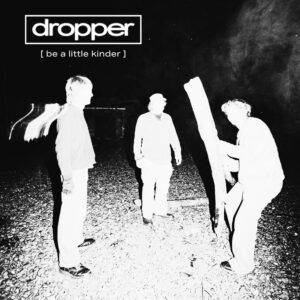13th Floor Interview: John Hiatt Talks About His Leftover Feelings
John Hiatt has teamed up with acclaimed bandleader/producer/musician Jerry Douglas and released Leftover Feelings…11 tracks of classic Hiatt with a tinge of bluegrass.
The 13th Floor’s Marty Duda spoke to John Hiatt about making Leftover Feelings with Jerry Douglas and his band and about recording in Nashville’s RCA Studio “B”…home to classic albums by the likes of Patsy and Dolly, Elvis and The Everlys and Waylon and Willie.
Click here to listen to the interview:
Or, read a transcription here:
M: What’s the vibe like in Nashville these days?
J: The vibe is good. Things are slowly starting to open up a little bit. You know, people are coming out more and I was talking to some friends the other day, some of us feel like cavemen emerging from our caves. We don’t know whether to talk or grunt at each other. We’ve been sequestered for so long so there’s a little bit of a learning curve, how to get back in the swing of social existence.
M: When was the last time you performed in front of people?
J: You know I did two nights at a venue here in Nashville called City Winery this past summer. It’s a venue that holds 500 people and the tickets were limited to 100 seats. That was the last time I played a show for anybody and we’re anxious to take this record that I’ve done with Jerry Douglas out on the road end of this summer. We start in August here in the States.
 M: Excellent, that must be exciting. So Leftover Feelings is the record you’re referring to. Can you give me a little background on how this came to be, you working with Jerry on this record?
M: Excellent, that must be exciting. So Leftover Feelings is the record you’re referring to. Can you give me a little background on how this came to be, you working with Jerry on this record?
J: Well, you know I was talking with Ken Levitan, who has been my manager for the last 25 years and he’s a very creative guy, we’re always talking about the next record and what we might and might not want to try and mentioning musicians and places to record and getting sort of a feel for what might inspire a good recording and he started pulling out names as he will do and said, ‘What about, have you ever thought about this guy, this guy/’ And then he said, ‘Have you ever thought about doing something with Jerry Douglas?’ And I said, ‘Man what a great idea!’.
I’ve known Jerry, we’ve known each other over the years, not close but crossing paths here and there and playing on a couple of different sessions together. I think we met back in, it was the Nitty Gritty Dirt Band project, Will The Circle Be Unbroken, the second one and I was doing a song that I’d written with, a duet with Rosanne Cash and Jerry was a part of the band for that record so I think that’s when we met so we’ve known of each other but when my manager Ken said that I thought man, what a great idea. And apparently Jerry had a similar reaction so next think you know, we were ready to make a recording together. Originally we were going to go in the studio last April but of course, as with lots of people’s plans, they got changed by the pandemic and we had to put it off and finally we were able to do it in October.
M: What kind of discussions did you have with Jerry about what the record would sound like and approach you would have and how you would collaborate?
J: Well, we didn’t have any…he had a band that he’s worked with for the last four or five years of young musicians, wonderful players Christian Sedelmyer, the bass player Daniel, his last name has escaped me, and of course Mike on guitar, amazing players so he also has a drummer and I sort of suggested that we leave the drumming to the rhythm, acoustic rhythm instruments and bass player and let’s make our rhythm ourselves in a nod to sort of traditional bluegrass if you will and he thought it was a great idea. So that was the only hard and fast rule we had, other than that it was kind of let’s get together and see what happens which was sort of the way I approach recording in general anyway. I mean, we had four days at RCA Studio B to make the record and it just, I don’t think any of us kind of expected what we wound up getting to be honest with you.
M: The studio…I’ve seen some of the videos that look like they were recorded there, it looks like quite a monument to great American music of the past anyway so how important is that environment for you when you’re recording?
 J: It’s a wonderful studio of course, it’s been there since the 50s and everything from Floyd Cramer, The Everly Brothers, Chet Atkins, all the records he produced on various artists, Patsy Cline and oh my gosh, the list goes on, its endless…Elvis Presley for goodness sake. So a lot of great records and it has a sound, the room has a sound that if you get it right, it’s almost like having an additional musician playing along with you. So it was just a wonderful place to make a record. It’s a little tricky. It’s not an acoustically perfect room by any stretch. Much like a lot of the older recording studios, they had character. Not necessarily perfection, but they tried to get a live recording. It’s that kind of room.
J: It’s a wonderful studio of course, it’s been there since the 50s and everything from Floyd Cramer, The Everly Brothers, Chet Atkins, all the records he produced on various artists, Patsy Cline and oh my gosh, the list goes on, its endless…Elvis Presley for goodness sake. So a lot of great records and it has a sound, the room has a sound that if you get it right, it’s almost like having an additional musician playing along with you. So it was just a wonderful place to make a record. It’s a little tricky. It’s not an acoustically perfect room by any stretch. Much like a lot of the older recording studios, they had character. Not necessarily perfection, but they tried to get a live recording. It’s that kind of room.
M: Now of course you don’t have a record without any songs and so I’m assuming the songs were written specifically for the album. Am I correct or incorrect?
J: Well, for the most part as with all my records it’s just whatever I’ve written in the last year or two that accumulates and hopefully becomes enough good songs to even have the desire to go and make a new recording. So we started there with the exception of two songs. All The lilacs In Ohio was a song I’d already put out 20 ago on a record called The Tiki Bar Is Open and then there was a song on this record called Little Goodnight, which is a song I wrote 33 years ago when our youngest was born and she was one of those babies who had great difficulty sleeping through the night. And I had never recorded that song. So with the exception of those two songs, they were all songs I’ve written in the last two years and six or seven of them during the pandemic. So I started sending the songs to Jerry and I think I sent him 15 different songs and we chose these 11 to record.
M: You mentioned All The Lilacs In Ohio, I grew near Ohio near Pennsylvania so it kind of strikes a note. Why did you revisit that one? Why did you want to go back to that?
J: It was the first one I thought of when we decided to make this record together with Jerry’s acoustic band because the original take was a real rough and tumble four piece rock band version and I liked it, I thought we did a good, it was a good, cool thing, but I thought the essence of the lyric maybe got a little bit lost. That was the first one I thought of. I thought it would lend itself to the voicings of these musicians the fiddle and Jerry’s dobro and upright bass so I thought we’d get a little more close to the body reading of the song. It’s the first song we recorded. Jerry’s from Ohio and the first thing he said was, to me, I don’t remember any lilacs in Ohio. So there you go. But you know the song’s inspired by a movie called Lost Weekend starring Ray Milland which, there’s actually a line that the lead character, he says, ‘I got a note from my girlfriend and I opened it and it smelled like all the lilacs in Ohio.’ and I thought it was beautiful so I stole it.
M: Excellent. Well steal from the best you know?
J: Indeed.
M: I was from Rochester, New York and that was kind of the lilac center in upstate New York, they have a big lilac festival every year.
J: I didn’t know that, so there you go.
M: So the album kicks off with a tune called Long Black Electric Cadillac. I’m not much of a car person, do they make electric Cadillacs?
J: Not yet but that was an exercise in wishful thinking. I’m hoping they’ll make a long, black, electric Cadillac that will go a thousand miles on a charge. I’ll be the first at the dealership if they do.
M: I love the video. Did you have a good time making that?
J: We had a blast. That was such a beautiful Caddy. And Jerry…I was gonna drive but I had shoulder surgery, I had a torn rotator cuff and I couldn’t use two hands, I’d just had the surgery and so Jerry chauffeured me about. But man what a beautiful car that was. 1970, this was the same year that I came to Nashville.
M: How has Nashville changed or remained the same in the last 50 years or so?
J: Oh my gosh, 50 years. Like everywhere else in the world it’s not…it was a small town when I came and very Southern. A lot of people have moved from other places since and it’s a bit more homogenized but it was very Southern, very laid back, very friendly, very open and small. It was charming and the music business was small. The country music business in those days, it literally existed on two streets, 16th Avenue South and 17th Avenue South which what was called Music Row. All the music businesses, all the studios and publishing companies and record companies were in little houses up and down those two streets and going about 10 blocks in each direction. It was very accessible; it had a very accessible feel to it.
M: I guess nowadays it’s not just Country music that’s happening there cause I talk to lots of musicians who are based there and they aren’t necessarily country artists and rock ‘n’ rollers and all sorts of things.
J: Yeah, it’s a world center of popular music, all styles.
M: I was hoping to touch on, The Music Is Hot, the third track of the album which seems kind of sentimental and you mentioned Waylon and Merle and listening to the transistor radio…
J: Yeah, well those were incidentally, those were two songs that were recorded at RCA Studio B where we made the record so I kind of took those in there. It’s kind of, it’s about a gal, she’s a single parent and she’s just trying to get by and the music…it’s about how much the music of the day meant to her and that was kind of the 70’s, kind of going back to when I first got here and trying to capture that feel in a different character, somebody other than myself.
M: I noticed on a few tracks including that one, there’s some female backing vocals, Carmella Ramsey. Is that her name?
J: Carmella Ramsey, yeah, she’s a wonderful singer and plays a mean fiddle as well. Yeah she’s got a beautiful voice and she’s a great fiddle player..
M: When you recorded, were you all in the same room together recording live in the studio?
J: Very much so. We set up…that’s what works best in RCA Studio B and that’s the way it was done over the years. We had four days to record the record and we had some gobos set up in between and we had to set up a little further apart than we would of if it hadn’t been for the pandemic but we still were within eyesight of each other and it was all live, singing and playing, there were no vocal overdubs or anything. For me, I sang and played the songs and the guys played along with me. They did a few subsequent overdubs fleshing out a few parts. I think Daniel Kimbro and Christian Sedelmyer got together and did a little string quartet on a song called Buddy Boy, that was an overdub. But the performances are all live off the floor.
M: You mentioned Buddy Boy, I was kind of wondering who the song was written about or to and I was wondering if it was possibly written to yourself?
J: Yeah, it is kind of a pep talk but it’s written…it’s a pep talk for every guy who keeps screwing up and wonders why he can’t keep from screwing up you know. It’s one of those.
M: One song that I’m assuming may have been difficult to write for you is Light of the Burning Sun. It seemed very personal and very sad as well. Is that something that you had to think long and hard about writing that song?
J: Well, it just was a song that it was time to write it. As you pointed out, it’s about my oldest brother taking his own life when he was 21 and I was 11. This would have been 1963 and of course I’m sure you know people who have been affected by suicide in their lives . It’s something you deal with for the rest of your life. And I’ve done a lot of work around it but it was, it just kind of came out and it was a great release to write a song. So I think it was kind of a fulfilment of all the stuff I’ve gone through in my life with loss and the grief and all that stuff. It was cathartic.
M: Therapeutic?
J: Therapeutic and also, I like the fact that it can connect me to other people who have had a similar experience.
M:You’ve been writing songs for a long time, does your songwriting method, has it changed at all? You’ve had ups and downs in your career, it’s taken you a while to take off and I imagine when that was happening you had to look at yourself and rethink things. What was that process like?
J: Well, I started…the big change came with Bring The Family, finally finding a bit of an audience and it was subsequent to my getting…finally getting clean and sober from my alcohol and drug abuse back in 1984, and that was kind of the beginning of finding my musical voice and yeah, it’s kind of been an ever changing kind of game in terms of songwriting, but really I think it’s kind of simplified over the years and really the one discipline I have is to pick up the guitar and play it for at least an hour. So if a song is gonna come, that’s when it comes. So that’s really the only kind of discipline I have.
 M: And of course, your daughter Lily is a recording artist now, I’ve got a few of her records hanging around here, and I’ve got to ask you what kind of advice you give her as far as songwriting and just in general dealing with the music business.
M: And of course, your daughter Lily is a recording artist now, I’ve got a few of her records hanging around here, and I’ve got to ask you what kind of advice you give her as far as songwriting and just in general dealing with the music business.
J: I don’t give her advice. We talk all the time about the ups and downs and touring or dealing with the record company or a sticky situation or this happy other thing but she has her own voice and I actually think she’s a terrific songwriter and singer and she’s a great rhythm guitar player.
M: Did you always know she was going to be a performer?
J: Well you know, she was the middle child and she kind of hid it from us. And she entered the high school talent show when she was 16 and I knew she had a guitar cause I gave her one and she was up there in her room and we’d occasionally just hear little rumblings but all of a sudden she went to the junior high, junior year talent show and she got up and sang Wild Horses and Angel From Montgomery and our jaws kind of dropped, we didn’t really know that she could do that. It was amazing.
M: That’s fantastic.
J: Yeah, it’s pretty great.
M: So the album wraps up with a tune called Sweet Dream and in there there’s a lyric about getting harder to travel and there’s a beautiful little guitar and fiddle interlude in the middle of it and there’s references to The Catskills and Bear Mountain, so is there a reason that’s at the end of the album? It is getting harder to travel so you seem somewhat prescient there.
J: Indeed. That song is kind of a sequel…t’s kind of a dreamlike sequence to me of places I’ve been in my travels and the feeling of it. Like I was up in The Catskills on Bear Mountain when I was about 17 trying to hitchhike home and I did wind up on that road that nobody drove on since they built the new one and the shoe salesman did pick me up and I did sleep by the side of the road in New Jersey one time, so it’s kind of like a little dream sequences from my life and we did have a …. for 25 years while we raised the kids and it was back up in a hollow but I met people up there that, family had lived up in that area for generations passed had lived up in that hollow for 200 years, it’s like little snippets of my life, sort of a travelogue.
M: One thing I’ve noticed recently, well Bob Dylan just turned eighty, and I spoke to Judy Collins the other day, I think she’s in her early eighties or someplace, Willie Nelson’s getting on, I mean, age for some reason, the singers and songwriters and musicians who started off in the fifties and sixties just seem to not want to ever stop. Do you think about aging much and where you’re going and what you’re doing and what you want to do yet?
J: Well, I’ll turn 69 in a couple of months and I don’t really…I mean, playing guitar, songwriting, making records, going out and singing for folks is kind of what I’ve done since I was 18 and I just can’t imagine not doing it. I mean I’m grateful to be able to do this for a living and I want to keep doing it as long as my health allows. And I’m in good shape, I feel really good.
M: I noticed in the video, I was like ‘dog, he looks good’.
J: I feel pretty good for an old fella.
M: There’s no reason to fall apart these days. Do you have any plans for anything upcoming? I realize this record just came out so you may be wanting to rest.
J: We’re gonna start a tour here in the States, I think it’s August 19th and we’re gonna be in and out of town but run through December and then in early ‘22 I think we’re gonna go to the UK and Europe and we’d love to come to New Zealand and Australia in 2022 it’d be great, we’d love to do it.
M: When you’re touring are you touring with the Jerry Douglas Band?
J: Yes.
M: That’s gonna be something.
J: Looking forward to it.
Leftover Feelings is out now. Watch for our interview with Jerry Douglas coming soon.
